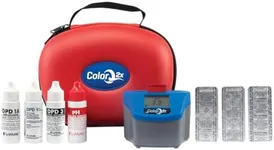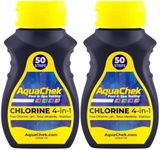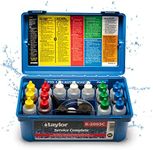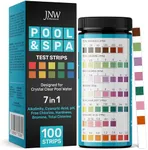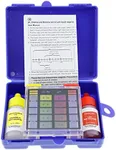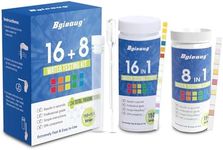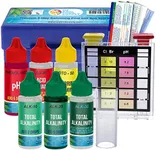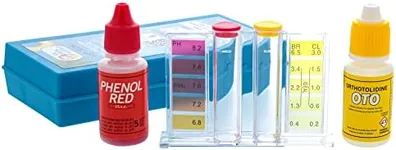Buying Guide for the Best Pool Testers
Choosing the right pool tester is essential for maintaining the health and safety of your swimming pool. A pool tester helps you monitor the chemical levels in your pool water, ensuring it is safe for swimming and free from harmful bacteria. When selecting a pool tester, consider the key specifications that will best meet your needs and provide accurate, reliable results. Here are some important factors to consider when choosing a pool tester.Type of TesterPool testers come in various types, including test strips, liquid test kits, and digital testers. Test strips are easy to use and provide quick results, making them ideal for casual pool owners. Liquid test kits offer more precise readings and are suitable for those who want more detailed information about their pool's chemical levels. Digital testers provide the most accurate results and are perfect for those who want a high level of precision and ease of use. Choose the type of tester based on your need for accuracy, ease of use, and the level of detail you require.
Parameters TestedDifferent pool testers measure different parameters, such as pH, chlorine, alkalinity, and calcium hardness. It is important to know which parameters are crucial for maintaining your pool. For basic maintenance, a tester that measures pH and chlorine levels may be sufficient. However, for more comprehensive water quality management, consider a tester that also measures alkalinity, calcium hardness, and other important parameters. Your choice should be guided by the specific needs of your pool and the level of detail you want in your water quality analysis.
AccuracyAccuracy is a critical factor when choosing a pool tester, as it directly affects the safety and quality of your pool water. Test strips are generally less accurate than liquid test kits and digital testers. Liquid test kits offer a good balance of accuracy and ease of use, while digital testers provide the highest level of accuracy. If you require precise measurements to maintain optimal water quality, a digital tester may be the best choice. For general maintenance, a liquid test kit or high-quality test strips may suffice.
Ease of UseThe ease of use of a pool tester can significantly impact your pool maintenance routine. Test strips are the easiest to use, requiring only a quick dip in the water and a comparison to a color chart. Liquid test kits involve more steps, such as adding reagents and comparing colors, but they are still relatively straightforward. Digital testers are the easiest in terms of reading results, as they provide a digital readout, but they may require more initial setup and calibration. Choose a tester that matches your comfort level with the testing process and the time you are willing to spend on pool maintenance.
Durability and LongevityDurability and longevity are important considerations, especially if you plan to use your pool tester frequently. Test strips are typically single-use and need to be replaced regularly. Liquid test kits can last longer, but the reagents may have a limited shelf life. Digital testers are generally more durable and can be used for many years with proper care and maintenance. Consider how often you will be testing your pool water and choose a tester that will provide reliable performance over time.
Cost of ConsumablesThe cost of consumables, such as test strips or reagents, can add up over time. Test strips are usually the most affordable option initially, but they need to be replaced frequently. Liquid test kits have a moderate cost for reagents, which need to be replenished periodically. Digital testers may have a higher upfront cost, but their consumables, such as calibration solutions, are typically less frequent and less expensive. Consider the long-term cost of maintaining your pool tester and choose one that fits your budget and testing frequency.
